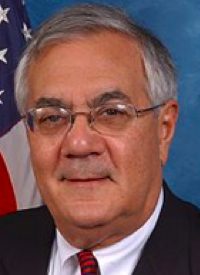
Massachusetts ultra-liberal Democrat Barney Frank has a real race for the first time in more than two decades, in part because of his record of coddling — and taking campaign contributions from — the financial institutions at the center of the housing bubble.
Frank will face political newcomer and former Democrat Sean Bielat in November. Bielat is no conservative. He talks about governing from the middle, has come out in favor of a tax hike for Social Security by raising the income level subject to taxation, and although he has vaguely called for spending cuts hasn’t proposed abolishing any agency spending over $1 billion.
Nevertheless, Bielat won $400,000 in donations in the month after the two-way GOP primary. This is compared with only $261,841 he raised before the primary. And yet Bielat contends that he’s still going to be outspent by nearly 10-1. Federal Elections Commission filings report that Frank raised $2,415,949 during the primary season; over $600,000 of that amount was from political action committees, mostly from banks and financial services companies he oversees as Chairman of the House Financial Services Committee.
In the 2008 election cycle, Frank received $2,500 in donations from the American Bankers Association and many of the sub-prime banks and brokerage companies whose dangerous practices (which he helped to protect) built the housing bubble: Bear Stearns ($5,000), Goldman Sachs ($5,500), National Association of Home Builders ($7,500), Mortgage Bankers Association ($3,500) Fannie Mae ($6,000), Freddie Mac ($3,000) Bank of America ($2,000), Citigroup ($5,000), Countrywide ($2,000), National Association of Realtors ($3,000) and so on.
Clearly, those engaged in risky financial operations got their money’s worth. Frank backed their ability to expand risky no-down-payment mortgages, even for poor credit risks in minority neighborhoods under the Community Reinvestment Act, and then voted to bail them out with $700 billion in taxpayer dollars when their outrageously risky gamble inevitably went bust.
Bielat is focusing upon the banking crisis in his campaign. He noted in an Oct. 7 letter to Frank (the two have shared a correspondence, even though they have yet to debate face-to-face) that perhaps you can send me additional letters asking for my positions on your driving role in the housing market crash, foreclosures, double-digit unemployment, the failed stimulus billions, a bank bailout that does nothing for regular workers and families while bankers collect bonus billions, the skyrocketing cost of health insurance, funneling over $12 million of taxpayers’ money to a friend’s bank, and many, many other issues on which my opinion might interest you and voters.
Frank for his part contends he isn’t in danger, claiming that internal campaign polls have him up by some 20 points. But the campaign drew national attention when Frank brought former President Clinton into the district city of Taunton on September 26. [Bielat] started out by saying that I was going to be arrogant and not campaign, Frank told the Brockton Enterprise for October 7. Now that Im campaigning he said it means I’m desperate.
Frank is clearly the favorite to win in November, but the housing bubble he denied existed for years has resulted in a real race for him.

